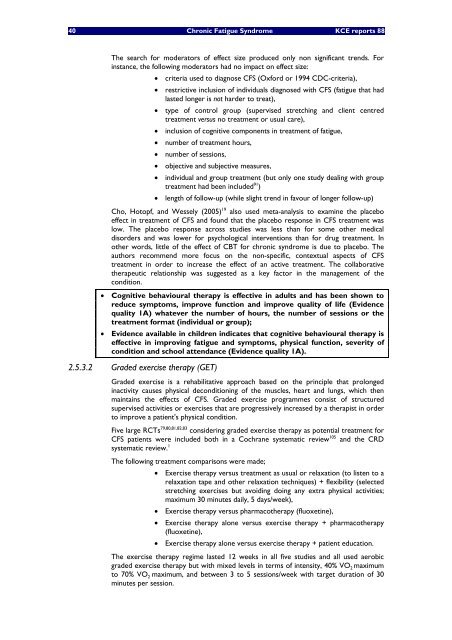Chronisch Vermoeidheidssyndroom: diagnose, behandeling en ...
Chronisch Vermoeidheidssyndroom: diagnose, behandeling en ...
Chronisch Vermoeidheidssyndroom: diagnose, behandeling en ...
Create successful ePaper yourself
Turn your PDF publications into a flip-book with our unique Google optimized e-Paper software.
40 Chronic Fatigue Syndrome KCE reports 88<br />
The search for moderators of effect size produced only non significant tr<strong>en</strong>ds. For<br />
instance, the following moderators had no impact on effect size:<br />
• criteria used to <strong>diagnose</strong> CFS (Oxford or 1994 CDC-criteria),<br />
• restrictive inclusion of individuals <strong>diagnose</strong>d with CFS (fatigue that had<br />
lasted longer is not harder to treat),<br />
• type of control group (supervised stretching and cli<strong>en</strong>t c<strong>en</strong>tred<br />
treatm<strong>en</strong>t versus no treatm<strong>en</strong>t or usual care),<br />
• inclusion of cognitive compon<strong>en</strong>ts in treatm<strong>en</strong>t of fatigue,<br />
• number of treatm<strong>en</strong>t hours,<br />
• number of sessions,<br />
• objective and subjective measures,<br />
• individual and group treatm<strong>en</strong>t (but only one study dealing with group<br />
treatm<strong>en</strong>t had be<strong>en</strong> included 91 )<br />
• l<strong>en</strong>gth of follow-up (while slight tr<strong>en</strong>d in favour of longer follow-up)<br />
Cho, Hotopf, and Wessely (2005) 19 also used meta-analysis to examine the placebo<br />
effect in treatm<strong>en</strong>t of CFS and found that the placebo response in CFS treatm<strong>en</strong>t was<br />
low. The placebo response across studies was less than for some other medical<br />
disorders and was lower for psychological interv<strong>en</strong>tions than for drug treatm<strong>en</strong>t. In<br />
other words, little of the effect of CBT for chronic syndrome is due to placebo. The<br />
authors recomm<strong>en</strong>d more focus on the non-specific, contextual aspects of CFS<br />
treatm<strong>en</strong>t in order to increase the effect of an active treatm<strong>en</strong>t. The collaborative<br />
therapeutic relationship was suggested as a key factor in the managem<strong>en</strong>t of the<br />
condition.<br />
• Cognitive behavioural therapy is effective in adults and has be<strong>en</strong> shown to<br />
reduce symptoms, improve function and improve quality of life (Evid<strong>en</strong>ce<br />
quality 1A) whatever the number of hours, the number of sessions or the<br />
treatm<strong>en</strong>t format (individual or group);<br />
• Evid<strong>en</strong>ce available in childr<strong>en</strong> indicates that cognitive behavioural therapy is<br />
effective in improving fatigue and symptoms, physical function, severity of<br />
condition and school att<strong>en</strong>dance (Evid<strong>en</strong>ce quality 1A).<br />
2.5.3.2 Graded exercise therapy (GET)<br />
Graded exercise is a rehabilitative approach based on the principle that prolonged<br />
inactivity causes physical deconditioning of the muscles, heart and lungs, which th<strong>en</strong><br />
maintains the effects of CFS. Graded exercise programmes consist of structured<br />
supervised activities or exercises that are progressively increased by a therapist in order<br />
to improve a pati<strong>en</strong>t's physical condition.<br />
Five large RCTs 79,80,81,82,83 considering graded exercise therapy as pot<strong>en</strong>tial treatm<strong>en</strong>t for<br />
CFS pati<strong>en</strong>ts were included both in a Cochrane systematic review 105 and the CRD<br />
systematic review. 1<br />
The following treatm<strong>en</strong>t comparisons were made;<br />
• Exercise therapy versus treatm<strong>en</strong>t as usual or relaxation (to list<strong>en</strong> to a<br />
relaxation tape and other relaxation techniques) + flexibility (selected<br />
stretching exercises but avoiding doing any extra physical activities;<br />
maximum 30 minutes daily, 5 days/week),<br />
• Exercise therapy versus pharmacotherapy (fluoxetine),<br />
• Exercise therapy alone versus exercise therapy + pharmacotherapy<br />
(fluoxetine),<br />
• Exercise therapy alone versus exercise therapy + pati<strong>en</strong>t education.<br />
The exercise therapy regime lasted 12 weeks in all five studies and all used aerobic<br />
graded exercise therapy but with mixed levels in terms of int<strong>en</strong>sity, 40% VO 2 maximum<br />
to 70% VO 2 maximum, and betwe<strong>en</strong> 3 to 5 sessions/week with target duration of 30<br />
minutes per session.

















